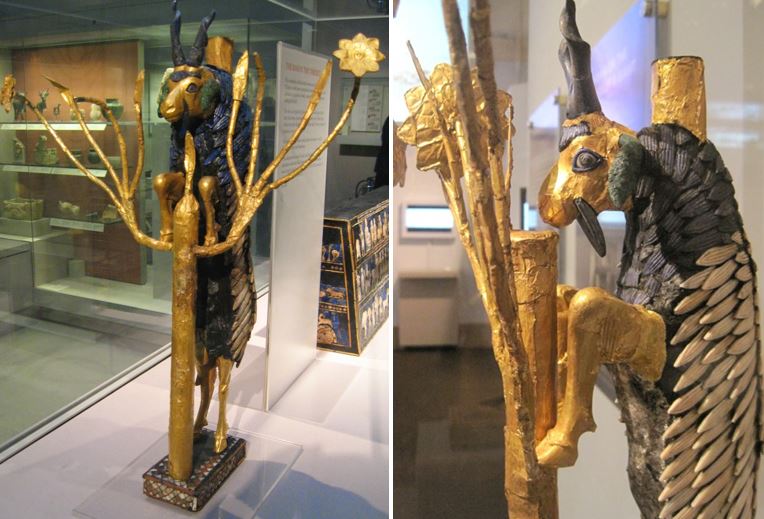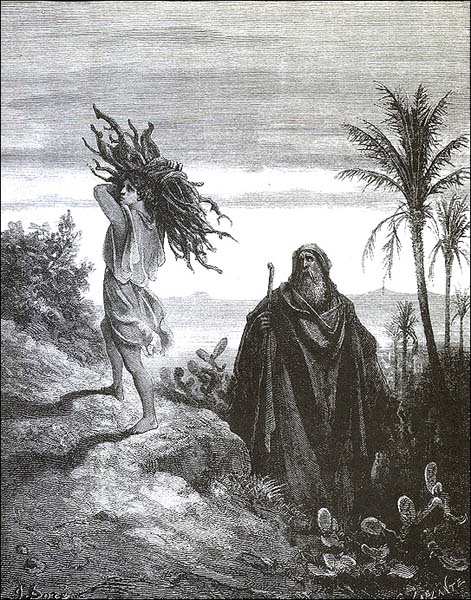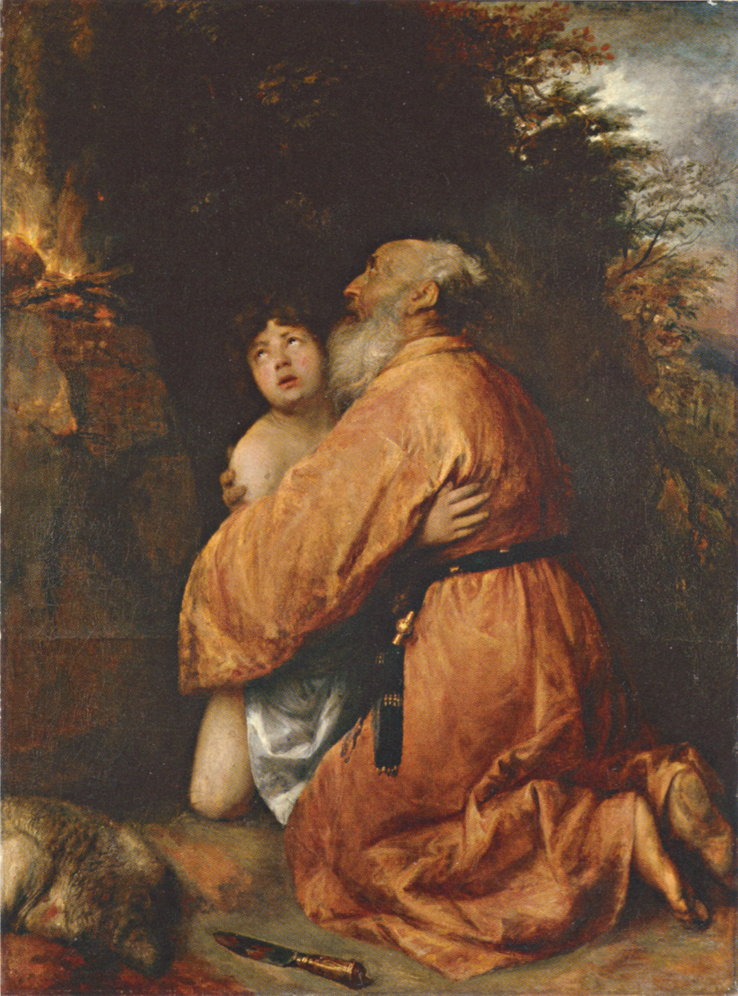Dear Brothers and Sisters,
 Some years ago while visiting the British Museum, I was deeply impressed by a beautiful statuette (pictured below) made of gold, copper and shells. Archaeologists from the British Museum and the University of Pennsylvania uncovered a pair of these statuettes while working jointly on an excavation at the Royal Cemetery of Ur in southern Iraq. Supervising archaeologist, Sir Charles Leonard Woolley, named them Ram in a Thicket—a phrase taken from the Genesis 22 story about Abraham’s willingness to offer Isaac in sacrifice to God.
Some years ago while visiting the British Museum, I was deeply impressed by a beautiful statuette (pictured below) made of gold, copper and shells. Archaeologists from the British Museum and the University of Pennsylvania uncovered a pair of these statuettes while working jointly on an excavation at the Royal Cemetery of Ur in southern Iraq. Supervising archaeologist, Sir Charles Leonard Woolley, named them Ram in a Thicket—a phrase taken from the Genesis 22 story about Abraham’s willingness to offer Isaac in sacrifice to God.
A story of faith
The Genesis 22 story is typically explained as God testing Abraham’s faith and obedience (with Isaac’s obedience also noted). Though there is disagreement on some of the details, it is a key story in the flow of the Bible. Both the apostle Paul and the author of Hebrews present Abraham as a model of faith, with Hebrews interpreting the Genesis 22 story as a type, prefiguring the atoning sacrifice of Jesus:
By faith Abraham, when he was tested, offered up Isaac, and he who had received the promises was offering up his only begotten son; it was he to whom it was said, “In Isaac your descendants shall be called.” He considered that God is able to raise people even from the dead, from which he also received him back as a type. (Hebrews 11:17-19 NASB)

Some skeptics and atheists see the Genesis 22 story as proof that God is a moral monster. But in drawing that conclusion, they are overlooking a key point in the story. Having taken Isaac and two of his servants with him on the trip to Mount Moriah, Abraham ordered his servants to wait behind while he and Isaac ascended the mountain. He told them, “We will worship and then we will come back to you” (Genesis 22:5, italics added). Note that Abraham said both he and Isaac would return. Abraham was not lying—he had faith God would intervene. Like Moses after him, Abraham knew that the Lord, rather than being a moral monster, is “the compassionate and gracious God, slow to anger, abounding in love and faithfulness” (Exodus 34:6).

(public domain picture)
How did Abraham know this? He no doubt remembered what God had done several years before to make Isaac’s birth possible by intervening in the barren womb of Sarah. Knowing God’s love and faithfulness, Abraham trusted God to intervene once more. The story continues:
Abraham took the wood for the burnt offering and placed it on his son Isaac, and he himself carried the fire and the knife. As the two of them went on together, Isaac spoke up and said to his father Abraham, “Father?” “Yes, my son?” Abraham replied. “The fire and wood are here,” Isaac said, “but where is the lamb for the burnt offering?” Abraham answered, “God himself will provide the lamb for the burnt offering, my son.” (Genesis 22:6-8)
Again, Abraham was not lying—he was trusting God to intervene and Abraham’s words no doubt encouraged Isaac’s obedience when the time came for him to be bound and placed on the altar of sacrifice.
Imagine Abraham’s thoughts at the climactic moment when he took the knife and began to raise it above his son’s body now prostrate on the altar… And then came a voice…
The angel of the Lord called to him from heaven and said, “Abraham, Abraham!” And he said, “Here I am.” [The angel] said, “Do not stretch out your hand against the lad, and do nothing to him; for now I know that you fear God, since you have not withheld your son, your only son, from Me.” (Genesis 22:11-12 NASB)
The faithful God

Looking up, Abraham saw a ram caught by its horns in a nearby thicket. The ram was provided by the Lord as a substitute for Isaac (Genesis 22:13). In response, and no doubt with gratitude, Abraham called the place “The Lord Will Provide” (Genesis 22:14). This amazing scene unfolded on Mount Moriah, a name meaning “seen by Yahweh.” Seeing our need as fallen humanity, God showed through this incident his faithfulness as the God who provides—the God who meets our need for salvation through “the Lamb of God who takes away the sin of the world” (John 1:29). In Jesus, God has provided the only sacrifice needed for us to be in eternal, right relationship with him.
Through this amazing event on Mount Moriah (where Solomon later built the temple), God made it clear that he abhors human sacrifice, including the sacrifice of children (Deuteronomy 12:31; Jeremiah 7:31; Leviticus 20:2-5; Jeremiah 32:35; Ezekiel 20:26; Isaiah 57:4-5).
Though Abraham apparently did not understand the details of what God had planned concerning the sacrifice, we know he trusted God to preserve Isaac’s life. Though his faith was perhaps small, nevertheless Abraham acted in faith, trusting God to be faithful. As a result, Abraham’s story of faith was incorporated into the lessons God taught Israel—lessons passed down through the years to us. Predominant among those lessons is that the sacrifice God wants from us is that of the heart—a willingness to give up our distrust and unbelief and count on God to provide the way into fellowship and communion with him, even when we can’t see the way forward. Abraham taught us well, and that’s one reason he is called the father of the faithful.
A prophetic story
The story of Abraham and Isaac on Mount Moriah is prophetic, prefiguring God the Father sending his Son. In fulfillment of the sign of Abraham and Isaac, God the Father offered up his only Son in sacrifice for us, not withholding him. Then, adding a second twist to the Abraham-Isaac story, he brought Jesus back by raising him up from the dead. By giving himself to us in his Son, God provided himself as our One True Sacrifice—our One True Offering and restored us to right relationship and communion with himself. Jesus is God’s own total Provision for us all.
Trusting in the faithful God who provides,
Joseph Tkach
____________
PS: For GCI.org articles about the faith of Abraham, click here and here.



Perhaps God was powerfully revealing to Abraham that child sacrifices were in fact not required to please or appease God. Abraham’s background would have acquainted him with surrounding pagan practices and beliefs (some of which were horrible). Abraham’s relationship with God was also a learning process involving a change in worldview.
Jesus gave willingly Himself over to death as a supreme act of love. His sacrifice was not about appeasing the wrath of the “volcano god” who demands retribution and payment. God’s justice is grossly misunderstood. Humans seek revenge and compensation. But, God reaches down to us becoming poor so that we might become rich. Jesus is all about grace. That grace, I believe, will also be extended one day to Hitler, Stalin, Pol Pot and the many others whose hands are soaked in innocent blood. This is hard for me to understand. Yet, I believe this grace to be real and true (while not advocating universalism). Whatever Abraham might have thought, he did place his trust in God as one who is able. That example, I pray, is one that we ought also be willing to follow.
Thank you. This is a valuable post on issues of faith. The story of Abraham has always given me inspiration, considering that Abraham did not have written scriptures to turn to, on issues of faith.
Rightly, you characterize God as generous in his provision. But it is paradoxical that North American evangelical Christianity is one of the least generous belief systems I have encountered. Evangelicals believe in the salvation of the few (and only people like themselves) and gloatingly derive joy from the condemnation of the many. Rob Bell wrote a book that re-examined the extremity of the cherished evangelical doctrine of hell and this generated a tsunami of vitriol among evangelicals. And they knew he was not a universalist – he just tipped the balance in favor of God’s love. Maybe one day, evangelicals will join mainstream Christianity, correct their view of God and recognize the wider hope in the Gospel that Jesus brought and taught.